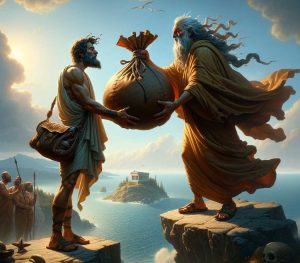The Aid of Aeolus King of the Winds

Aeolus, recognizing Odysseus’s valor and the divine favor he carries, welcomes him warmly, offering hospitality for a month. During their stay, Odysseus tells Aeolus of his trials and tribulations since leaving Troy.
Moved by Odysseus’s stories and struggles, Aeolus decides to aid him on his journey back to Ithaca. He gives Odysseus a leather bag containing all the winds, except the West Wind, which would safely and surely guide them home. Aeolus instructs Odysseus not to open the bag, as it contained the powerful winds that could drive them off course.
Odysseus gratefully accepts the gift, and they set sail once again, with Ithaca finally within reach. Trusting in the West Wind to guide them, Odysseus’s ships near their homeland. However, as they approach Ithaca, Odysseus, exhausted from the vigilance required to navigate their journey, finally succumbs to sleep.
While Odysseus sleeps, his crew, driven by curiosity and the suspicion that the bag contains gold and silver given to Odysseus by Aeolus as a parting gift, decide to open it. Their disobedience unleashes the winds, which blow with such fury that the ships are driven far away from Ithaca, all the way back to Aeolia.
Upon their return, Aeolus is astounded and realizes that the gods must be against Odysseus. He refuses to assist them further, believing it would be against divine will to aid someone so clearly marked by misfortune. Dejected and without Aeolus’s support, Odysseus and his crew are forced to leave Aeolia, facing the sea’s challenges once more without the guidance of the winds.
This episode not only emphasizes the themes of human error and divine influence but also reflects on the fragility of hope and the continual challenges that Odysseus must overcome. It serves as a poignant reminder of the importance of trust and obedience in the face of divine assistance and the ever-present possibility of human folly undoing even the best-laid plans.
